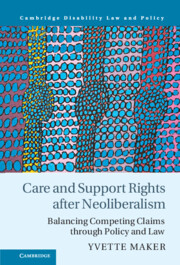Book contents
- Care and Support Rights after Neoliberalism
- Cambridge Disability Law and Policy Series
- Care and Support Rights after Neoliberalism
- Copyright page
- Contents
- Table
- Foreword
- Acknowledgments
- Abbreviations
- Introduction
- Part I Care Policy Tensions
- Part II Balancing Competing Claims through Rights-Based Policy and Law
- 5 A New Framework for Designing Rights-Based Care and Support Policy
- Part III Care and Support Policy Tensions in Two Liberal Welfare States
- Index
- Other Books in the Series
5 - A New Framework for Designing Rights-Based Care and Support Policy
from Part II - Balancing Competing Claims through Rights-Based Policy and Law
Published online by Cambridge University Press: 21 April 2022
- Care and Support Rights after Neoliberalism
- Cambridge Disability Law and Policy Series
- Care and Support Rights after Neoliberalism
- Copyright page
- Contents
- Table
- Foreword
- Acknowledgments
- Abbreviations
- Introduction
- Part I Care Policy Tensions
- Part II Balancing Competing Claims through Rights-Based Policy and Law
- 5 A New Framework for Designing Rights-Based Care and Support Policy
- Part III Care and Support Policy Tensions in Two Liberal Welfare States
- Index
- Other Books in the Series
Summary
This chapter introduces a set of six principles to guide the evaluation and design of rights-based care and support policy in liberal welfare states. The principles build on and extend the reconciliation efforts discussed in earlier chapters, using the common thread of social citizenship rights claims that runs through the feminist, carer and disability rights perspectives. The principles provide criteria for evaluating the extent to which existing policies encompass the concerns of multiple care and disability perspectives, including whether they ease policy tensions between supporting women’s unpaid care and paid work and between meeting the claims of carers and those of people with disabilities. The principles can also inform the design of policies that promote equal social citizenship rights to care, support and paid work participation for all parties to these relationships. The principles address matters including access to financial resources and good quality services; flexibility in how life is organized; time for unpaid care, paid work and self-care; incorporation of the ‘voice’ of all affected people in the policy design; and responding to difference associated with gender inequality, disability and impairment, and citizenship status.
Keywords
- Type
- Chapter
- Information
- Care and Support Rights After NeoliberalismBalancing Competing Claims Through Policy and Law, pp. 97 - 136Publisher: Cambridge University PressPrint publication year: 2022

